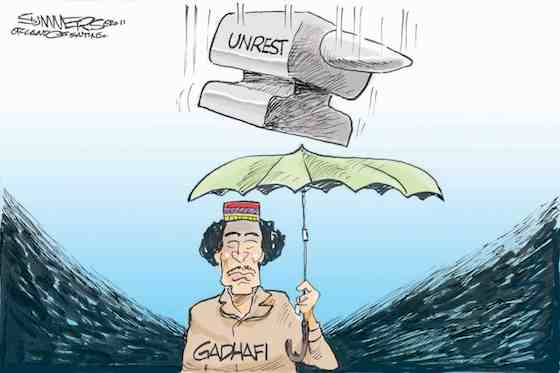- MENU
- HOME
- SEARCH
- WORLD
- MAIN
- AFRICA
- ASIA
- BALKANS
- EUROPE
- LATIN AMERICA
- MIDDLE EAST
- United Kingdom
- United States
- Argentina
- Australia
- Austria
- Benelux
- Brazil
- Canada
- China
- France
- Germany
- Greece
- Hungary
- India
- Indonesia
- Ireland
- Israel
- Italy
- Japan
- Korea
- Mexico
- New Zealand
- Pakistan
- Philippines
- Poland
- Russia
- South Africa
- Spain
- Taiwan
- Turkey
- USA
- BUSINESS
- WEALTH
- STOCKS
- TECH
- HEALTH
- LIFESTYLE
- ENTERTAINMENT
- SPORTS
- RSS
- iHaveNet.com
By Jessica Rettig

A deal might end Libya's protracted conflict
Libyan leader Col. Moammar Qadhafi may finally be on his way out. Strapped for cash and fuel for his regime, reports from Libya suggest that the violent ruler may be willing to accept defeat -- that is, if he's allowed to walk away unpunished.
Earlier this year at the height of the Arab Spring protests, Qadhafi seemed unrelenting in his campaign to suppress the opposition in Libya. But after nearly five months of war, both he and the NATO-backed rebels of eastern Libya appear ready to reach a conclusion. Western nations, represented together in this conflict by NATO, are pushing for a political solution, but how and when that compromise will happen still remains in the hands of the Libyans.
"There has to be a political solution, led by Libyans, supported by the international community, and fulfilling the legitimate demands of the Libyan people as the
For the Obama administration and its NATO allies, the top concern is getting Qadhafi off his tyrannous throne. For months, and at the order of a
According to top officials, that goal -- whether carried out through diplomacy or force -- seems within reach. "Although neither of us can predict to you the exact day or hour that Gadhafi will leave power, we do understand and agree that his days are numbered," said Secretary of State Hillary Clinton Wednesday at a press conference with Russian Foreign Minister Sergei Lavrov.
Russia, which had refused in March to sign on to the NATO mission against Qadhafi and has been critical of the attacks since, is using its position to mediate between the two sides in Libya.
If Qadhafi is indeed even willing to step down, the major obstacle to compromise will likely be over what happens to him and his family next, says Marina Ottaway, a senior associate at the Carnegie Endowment for International Peace's Middle East program. "The only way in which anybody might have a hope of getting Qadhafi to step down is if he's given some guarantees that he's not going to be turned over to the International Criminal Court," she says. "The compromise that is possible, then, hinges on whether he's extradited or not extradited. There's various ways that he can be provided with a guarantee."
The International Criminal Court, or the ICC, has issued arrest warrants for Qadhafi, his son and a top intelligence official in his regime for war crimes committed against civilians during the popular uprisings that began in February. Some have suggested using the warrant as a negotiation tool, but the ICC so far says it's reluctant to withdraw the charges.
While his demands are still unknown publicly, Qadhafi may be willing to relinquish his power if he is allowed to remain in Libya under protection, without threat of extradition. He might also be willing to accept exile to a nation like Zimbabwe, whose leader Robert Mugabe has welcomed other dictators of the past, like Mengistu Haile Mariam of Ethiopia. He is expected to demand security guarantees for his family members and top officials also.
The rebels too must be willing to let Qadhafi off the hook. Officially represented by the TNC, they have already been recognized by some countries as the legitimate representatives of Libya. But like the Libyan government in Tripoli, rebels are reporting resource shortages, as the country's major revenue source, oil, has been cut off since the start of the conflict. And now, advocacy group
Ottaway says that while it's unknown how leaders of the TNC would govern the country after Qadhafi, they're the only and best option available, as far as most international parties are concerned. "The TNC knows it has to change itself in order to govern the country. You don't govern Tripoli from Benghazi," she says. "Now, the process for putting together a functioning government is going to be tremendously difficult, but I don't think we have anyone better than the present TNC to start it."
For either side, the only other alternative to compromise is to continue to fight.
As the NATO mission continues, both sides in Libya are experiencing fatigue, and money and resources are low. And while the rebels, with the military aid of Western nations, were able to emerge from their defensive position in the conflict, help from the allies may not last forever. Concerns over Libya have been pushed aside to focus on domestic issues, but the
Available at Amazon.com:
Aftermath: Following the Bloodshed of America's Wars in the Muslim World
Displacement and Dispossession in the Modern Middle East (The Contemporary Middle East)
The End of History and the Last Man
The Clash of Civilizations and the Remaking of World Order
The Tragedy of Great Power Politics
©, U.S. News & World Report
WORLD | AFRICA | ASIA | EUROPE | LATIN AMERICA | MIDDLE EAST | UNITED STATES | ECONOMICS | EDUCATION | ENVIRONMENT | FOREIGN POLICY | POLITICS
World - Qadhafi's Days in Libya Are Numbered | Global Viewpoint